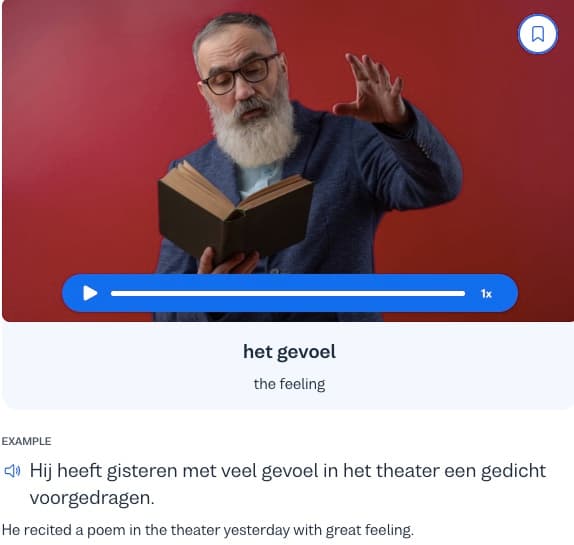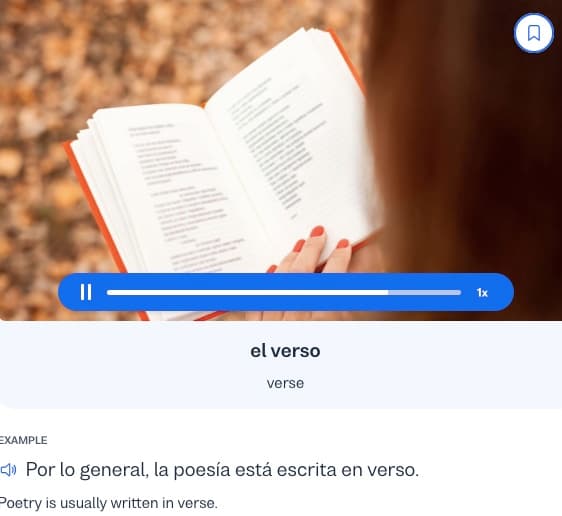I want to learn...
Author:

Barney Meekin
One of the best things about learning a new language is all the new content you have access to. Think about it, if you learn Spanish, you can read Don Quixote, watch Narcos, and understand Shakira’s lyrics. Your entertainment options go through the roof when you speak more than one language.
When I was a student (a long, long time ago) learning a language meant boring lessons, with boring teachers, from boring textbooks. We didn’t have access to all this amazing content. That’s all we had.
Nowadays you have access to anything you want. You can learn a language from TV shows and movies, from music, and from literature, of course. But before you reach for that novel. Take a moment to consider poetry.
I know it’s not a common way for people to learn a language. But poets understand language like no one else. So why not learn from the masters?
In this article, you’ll find out how poetry can help you master a new language.
Why poetry is good when learning a new language
Poetry is a fantastic resource for language learners. Every language and culture has poetry. No matter what language you study, you can benefit from poetry. Let’s take a look at why poetry is so good for language learners.
1. Poems are (usually) short
Unless you’re reading epic poetry,, poems are short. Sometimes as short as just a few lines. Unlike novels, which can take ages to get through, you can read a poem in minutes.
This is important for language learners. When reading a big novel, the time commitment and difficulty make completing it a challenge. Motivation can fade away. Poems, on the other hand, are a much more manageable and realistic task. And when tasks are achievable, motivation increases.
2. Poems give you insights into the culture
Poetry is such a well-established art form that it runs deep in most cultures around the world. By reading poetry, you can get fantastic insights into the people who wrote them and their culture. You learn about their emotions, their history, and their beliefs. While not directly related to the language, learning about cultures is an important part of mastering a new language.
3. Poems have rich vocabulary
Poets are master wordsmiths. The way they write can move, surprise, and delight readers. They create imagery in fascinating ways. You can see playful and creative language in poetry which will add an extra layer to your vocabulary knowledge.
How poetry can help you learn a language
If you’re a beginner language learner, you should steer away from poetry. You should learn everyday conversational language. But advanced learners can gain a lot from introducing poetry into their study routine. Here’s how.
1. Improves your pronunciation and rhythm
Poetry is not just written communication. It’s spoken communication too. Poets write poems to be heard. That means they pay incredible attention to rhyme and rhythm.
This is one of the biggest benefits of learning a new language with poetry (especially when you read classical and structured poetry). Classical poetry often follows a set meter. That means there’s a predetermined number of stressed and unstressed syllables on a line. Poets play with language to make it fit this pattern.
As language learners, you can use poetry to dial in your pronunciation. In classical poetry, the stressed syllables are predetermined, so when you read out loud, you know exactly what’s emphasized, and what isn’t. No guessing. Let me show you an example.
This is a line from Sonnet 18 by Shakespeare. Like many other English poems from the time it’s in the iambic pentameter — a fancy word that means 10 syllables per line starting with an unstressed syllable followed by a stressed syllable and so on.
Think of the rhythm like this: da DUM da DUM da DUM da DUM da DUM.
x / x / x / x / x /
Shall I compare thee to a summer’s day?
x = unstressed
/ = stressed
Bonus tip: Find a poem you like, and read it aloud. Pay attention to stressed syllables and weak forms, and you’ll gain a deeper understanding of pronunciation.
3. Boosts your vocabulary
Poets spend hours and hours finding the perfect word. Words you’ve never heard before. Or words you have, but used in a new way. They describe objects and emotions in unique ways. If you want access to advanced-level vocabulary, there are few better places than poetry.
Here’s an example of a poet using interesting words. Words you may not have heard before. These are lines from The Eagle by Alfred Tennyson.
“He clasps the crag with crooked hands;
Close to the sun in lonely lands,
Ring’d with the azure world, he stands.”
Word of warning: The vocabulary you find in poems might not be appropriate for everyday conversations. Remember poems are lyrical. They’re not how people speak in real life. Sure, you can learn a lot from poems. But if you start speaking to people like you’re a poet, you might get some unpleasant reactions.
3. Enhances your comprehension and critical thinking skills
Metaphors and similes are mainstays of poetry. Poets use them to create vivid imagery. To really understand a poem, some analysis is necessary. You can’t read it like you would a magazine or a blog because there are layers of meaning. You need to think about what the metaphors represent. And what emotions the poet is trying to communicate.
This sounds difficult because it is. But taking an analytical approach like this is great for your critical thinking skills. And it leads to a deeper level of comprehension.
Let’s look at an example of a poet using metaphor to create a vivid image. This is a line from the African-American poet Maya Angelou’s poem Still I Rise.
“Does my sassiness upset you?
Why are you beset with gloom?
'Cause I walk like I've got oil wells
Pumping in my living room.”
Bonus tip: Take your time when you read poetry. It’s not a race. Read slowly and carefully, make notes, and truly try to understand each idea.
4. Motivates you to learn
Learning a new language can be challenging, but it doesn't have to be a chore. Find ways to make it fun. Because without fun, motivation drops off.
Poetry is a great way to add fun and creativity to your language learning. You get away from the same old language learning materials. And you can have unique and meaningful experiences. Treat it like an adventure. When you find a poem you like. Read more work from that poet and the poets that influenced them. By following a poem you like upstream like this, you’ll never run out of poetry to read and analyze.
5. Increase your creativity
Writing poems is a great activity for language learners because of the constraints. If a teacher asks you to write a story, there are few constraints on what you can write. It could be five or 500 pages long. This makes writing a story relatively easy.
Poems, on the other hand, are naturally shorter so you need to find ways to say things in fewer words. Poems also have rules. For example, iambic pentameter. Or Japanese haiku with its restricted line length and number of lines.
Constraints like this lead to creativity. You can’t throw words onto a page like you could with a long story. You need to be thoughtful with your word choices. So set yourself the task of writing a poem — with strict criteria. For example: Write a poem about autumn that has eight lines. On each line, there must be 10 syllables.
Bonus tip: Japanese haiku are a great place to start with writing poems. The rules are strict and clear. There’s a narrow range of topics. And they’re very short.
Poems are a fantastic resource for language learners
Poetry isn’t just beautiful words on paper. It’s also a fantastic resource for advanced language learners. Through poetry, you can improve your pronunciation and range of vocabulary. You can boost critical thinking skills, motivation to learn, and creativity.
But reading poetry isn’t as simple as reading a book. You need to pay attention and take your time. To get the deeper meanings of poetry, you need to analyze the language. You need to interpret what the poet is trying to say. But if you do that, you can access one of the best resources for advanced language learners.
AUTHOR

Barney Meekin
Newlanguages


